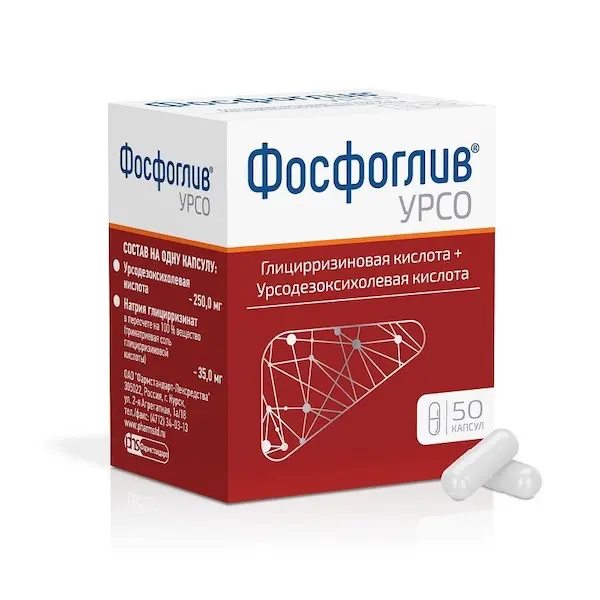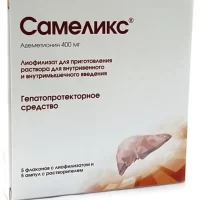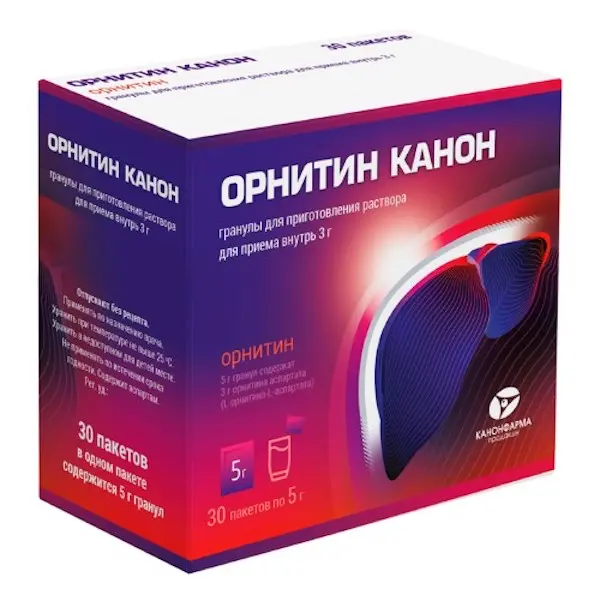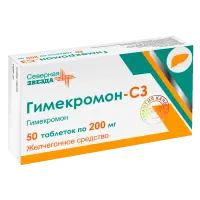Description
Ingredients per capsule:
Active ingredients :
ursodeoxycholic acid – 250.0 mg,
sodium glycyrrhizinate in terms of 100% substance (trisodium salt of glycyrrhizic acid) – 35.0 mg.
Excipients : microcrystalline cellulose M 101 – 30.5 mg, croscarmellose sodium – 6.6 mg, hyprolose (hydroxypropyl cellulose) – 3.3 mg, magnesium stearate – 2.8 mg, colloidal silicon dioxide (aerosil) – 1.8 mg .
The composition of the capsule shell (body and cap): titanium dioxide (E 171) – 1.92 mg, gelatin – 94.08 mg.
Phosphogliv Urso Pharmacodynamics
Combined drug, hepatoprotective agent, also has choleretic, cholelitholytic, antioxidant, anti-inflammatory actions, affects fibrogenesis.
Ursodeoxycholic acid
Ursodeoxycholic acid has a choleretic effect. It decreases synthesis of cholesterol in the liver, its absorption in the intestine and its concentration in bile, increases cholesterol solubility in the biliary system, stimulates formation and excretion of bile. It decreases bile lithogenicity and increases bile acids content; it causes intensification of gastric and pancreatic secretion, increases lipase activity and produces hypoglycemic effect. Causes partial or complete dissolution of cholesterol stones when administered enterally, decreases bile cholesterol saturation, which promotes mobilization of cholesterol from gallstones. It has immunomodulatory effect, affects immunological reactions in the liver: it reduces the expression of some antigens on the membrane of hepatocytes, affects the number of T-lymphocytes, formation of introleukin-2, reduces the number of eosinophils.
Glycyrrhizic acid.
It has a hepatoprotective effect due to its antioxidant, anti-inflammatory effects, and influence on fibrogenesis.
Glycyrrhizic acid binds free oxygen radicals and inhibits enzymes that initiate lipid peroxidation (LPO) in hepatocytes.
Glycyrrhizic acid reduces inflammation through its inhibitory effect on NF-kB- and TLR4-signaling pathways; inhibition of pro-inflammatory cytokine production (TNF α, IL-1, IL-6, IL-8); stimulation of anti-inflammatory cytokine production (IL-2, IL-10, IL-12). Glycyrrhizic acid inhibits 11β-oxysteroid dehydrogenase, which increases endogenous cortisol in the blood (pseudocorticosteroid effect).
The effect on fibrogenesis is associated with a decrease in collagen type 1 gene expression and a decrease in collagen production by hepatic stellate cells (Ito cells), as well as destruction of activated Ito cells through the natural killer system, which helps to slow down the progression of fibrosis.
Indications
– Non-alcoholic steatohepatitis;
– Alcoholic liver disease;
– Chronic hepatitis of different genesis;
– Biliary reflux gastritis;
– Biliary dyskinesia;
– Dissolution of cholesterol gallstones;
– Primary biliary cirrhosis in the absence of signs of decompensation;
– Primary sclerosing cholangitis.
Contraindications
– Hypersensitivity to Phosphogliv Urso components or other bile acids;
– X-ray-positive (high calcium content) gallstones;
– impaired ability of the gallbladder to contract;
– Frequent episodes of biliary colic;
– biliary tract occlusion (occlusion of the common bile or vesicular ducts);
– acute inflammatory diseases of the gallbladder and bile ducts;
– cirrhosis of the liver in decompensation stage;
– Severe hepatic insufficiency and/or renal failure;
– pregnancy;
– Breast-feeding period;
-children under 12 years of age;
– adults and children up to 47 kg of body weight (for this dosage form)
– unsuccessfully performed portoenterostomy or cases of failure to restore normal bile flow in children with biliary tract atresia.
Dosage and administration
To be taken orally.
Children over 12 years of age and adults with body mass over 47 kg should swallow the capsule in whole. The drug should be taken regularly.For convenience, dosage regimens for different indications are presented in terms of ursodeoxycholic acid.
Nonalcoholic steatohepatitis:
The average daily dose is 10-15 mg/k g in 2-3 doses. Duration of therapy is 6-12 months or more.
Alcoholic liver disease:
Average daily dose is 10-15 mg/kg in 2-3 doses. Duration of therapy is 6-12 months or more.
Symptomatic treatment of chronic hepatitis of differentgenesis:
Average daily dose is 10-15 mg/kg in 2-3 intakes. Duration of therapy 6-12 months or more.
Biliary reflux gastritis:
1 capsule of the drug daily in the evening before going to bed. The course of treatment – from 10-14 days to 6 months, if necessary – up to 2 years.
Biliary dyskinesia:
The average daily dose is 10 mg/kg in 2 doses for 2 weeks to 2 months.If necessary, it is recommended to repeat the course of treatment.
Dissolution of cholesterol gallstones:
The average daily dose of ursodeoxycholic acid is 10 mg/kg per day, which corresponds to:
- Body weight: up to 60 kg – 2 capsules;
- Body weight: 61 – 80 kg – 3 capsules;
- Body weight: 81-100 kg – 4 capsules;
- Body weight: 100 kg – 5 capsules.
Phosphogliv Urso should be taken in a daily dose once daily in the evening, before going to bed. It usually takes 6 to 24 months to dissolve stones. If stone size is not reduced after 12 months, treatment should be stopped. The effectiveness of treatment should be evaluated every 6 months by ultrasound or radiography. In an interim follow-up evaluation, it should be assessed whether the stones have calcified since then. If stones have calcifiedstones, treatment should be discontinued.
Primary biliary cirrhosis:
Daily dose depends on body weight and is from 2 to 6 capsules (about 10 to 15 mg of ursodeoxycholic acid per 1 kg of body weight). During the first 3 months of treatment, Phosphogliv Urso intake should be divided into several intakes during the day. After improvement of hepatic parameters the daily dose of the drug can be taken once in the evening.
Capsules should be taken regularly, without chewing, with a small amount of water.
Administration of Phosphogliv Urso for treatment of primary biliary cirrhosis may be continued indefinitely. In patients with primary biliary cirrhosis, in rare cases, clinical symptoms may worsen at the beginning of treatment, for example, itching may increase. In this case, treatment should be continued by taking one capsule daily, then the dosage should be gradually increased (increasing the daily dose weekly by one capsule) until the recommended dosage regimen is achieved again.
Primary sclerosing cholangitis:
The daily dose is 12-15 mg/kg; if necessary, the dose may be increased to 20 mg/kg in 2-3 doses. Duration of therapy is from 6 months.





